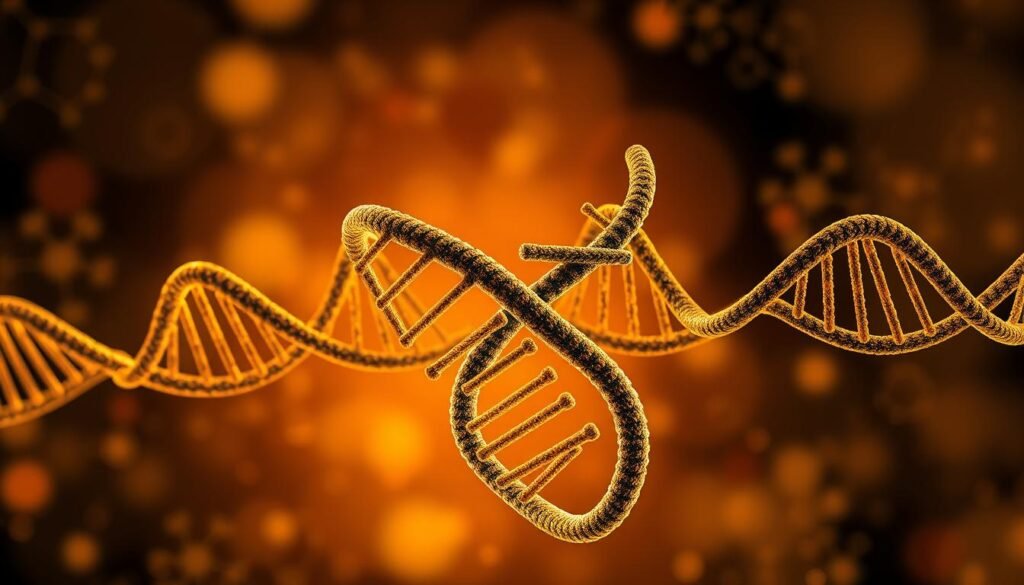Have you ever wondered if your weight is something you’re stuck with for life? I’ve spent years questioning whether genetics play a defining role in how our bodies store and manage weight. It’s a topic that hits close to home, especially when you see how different people respond to the same diet or exercise routine.
What I’ve learned is that weight isn’t just about calories in and out. Factors like metabolism, cellular processes, and even brain function can influence how our bodies handle weight over time. For instance, studies show that adults replace about 8% of their fat cells each year, maintaining a constant number of fat cells throughout life1. This makes me wonder: are we fighting a losing battle, or is there more to the story?
This article is my journey to understand the science behind weight and obesity. I’ll explore how genetics, lifestyle, and even childhood habits shape our bodies. My goal is to uncover the truth about whether we’re bound by our genes or if there’s a way to take control of our health.
Key Takeaways
- Genetics influence weight, but they’re not the only factor.
- Metabolism and cellular processes play a key role in weight management.
- Fat cells are replaced at a rate of 8% annually in adults1.
- Childhood habits can impact weight in adulthood.
- Understanding the process is crucial for long-term health.
Exploring Genetic Influences on Weight and Obesity
Genetics often feel like a hidden hand shaping our weight journey. I’ve always been curious about how much of our body’s ability to lose weight or gain it is tied to our DNA. Research shows that more than 50% of body mass index (BMI) is influenced by genetic factors2. This makes me wonder: are we fighting against our genes, or can we work with them?
The Role of DNA in Metabolism
Our DNA plays a big role in how our body processes food and burns calories. Studies have identified over 97 genetic regions linked to BMI, with some affecting how we store and use energy2. For example, certain genes can make it harder for a person to maintain a caloric deficit, even with diet and exercise. This explains why two people can follow the same plan but see different results.
Another key finding is that individuals with a higher genetic risk score for obesity weigh nearly 30 pounds more on average than those with a lower score3. This highlights how deeply our genes can influence our weight journey.
Genetics vs. Lifestyle: My Personal Perspective
While genetics are important, I believe lifestyle choices also matter. For instance, even if someone has a genetic predisposition to obesity, a balanced diet and regular exercise can still make a difference. However, it’s not as simple as eating less. Our system is complex, and genes can affect how our body responds to food and activity.
In my own experience, I’ve seen how challenging it can be to lose weight when your body is genetically inclined to store it. But understanding this has helped me focus on sustainable strategies rather than quick fixes. It’s about finding a balance between what’s in our control and what’s not.
Here’s a quick list of genetic markers researchers have linked to obesity:
- FTO gene: Associated with increased appetite and calorie intake.
- MC4R gene: Influences energy balance and metabolism.
- TMEM18 gene: Linked to higher BMI and weight gain.
These markers show how our genes can shape our weight, but they don’t define our destiny.
Forever Chemicals and Their Impact on Weight
What if the chemicals around us are silently shaping our weight? I’ve always been curious about how environmental factors, like PFAS and PFOS, might influence our bodies. These “forever chemicals” don’t break down naturally and can linger in our system for years4. This makes me wonder: could they be playing a hidden role in weight gain?

How PFAS Disrupt Cellular Energy
PFAS chemicals, like PFOS, interfere with cellular energy production. They replace hydrogen with fluorine in ATP molecules, disrupting the process our cells use to generate energy4. This can lead to a decrease in metabolic efficiency, making it harder for the body to burn calories effectively.
Research shows that PFOS exposure is linked to inflammation, which is a known factor in obesity4. This chemical also uses the same transporters as fatty acids, making it easier for it to accumulate in the body4. Over time, this can lead to significant weight gain, even with a balanced diet and regular exercise.
PFOS and the Inhibition of Fat Breakdown
PFOS doesn’t just disrupt energy production; it also inhibits fat breakdown. Studies have found that PFOS exposure can reduce the body’s ability to metabolize fats, leading to increased storage4. This can make losing weight feel like an uphill battle, even when you’re doing everything right.
Clemson professor William Baldwin has highlighted the connection between PFOS and obesity, noting that even small disruptions at the molecular level can have a big impact4. This aligns with my belief that weight loss isn’t just about calories in and out—it’s about understanding the complex systems at work in our bodies.
Here’s a quick list of how PFOS affects weight management:
- Disrupts cellular energy production.
- Increases inflammation, linked to obesity.
- Inhibits fat breakdown and metabolism.
Understanding this process is crucial for anyone on a weight loss journey. It’s not just about diet and exercise—it’s about recognizing the unseen factors that might be holding you back.
Fat Forever: Understanding the Genetic Predisposition
Why do some people struggle with weight more than others? For years, I’ve been fascinated by the role genetics play in weight management. Research shows that over 50% of body mass index (BMI) is influenced by genetic factors. This makes me wonder: are we destined to follow a genetic blueprint, or can we rewrite it?

Scientific Studies Linking Genetics and Weight
Studies have identified specific genes that influence weight gain and obesity. For example, individuals with variations in the FTO gene have a 20% to 30% higher chance of obesity5. This gene affects appetite and calorie intake, making it harder for some people to lose weight.
Another study found that PFOS, a chemical found in the environment, disrupts cellular energy production and inhibits fat breakdown5. This can compound genetic predispositions, making weight loss even more challenging.
Reflecting on My Own Weight Challenges
In my own life, I’ve faced struggles with weight loss. Despite following a strict diet and exercise routine, progress felt slow. This led me to explore the genetic factors at play. Understanding these influences has helped me create a more sustainable plan.
For instance, I’ve learned that cutting 500 to 1,000 calories a day can help a person lose 1 to 2 pounds per week5. However, this approach must be balanced with regular physical activity, like brisk walking or weight training, to maintain energy levels5.
| Gene | Impact on Weight |
|---|---|
| FTO | Increases appetite and calorie intake |
| MC4R | Affects energy balance and metabolism |
| TMEM18 | Linked to higher BMI and weight gain |
While genetics play a significant role, they don’t define our destiny. By understanding these factors, we can make informed choices about diet, exercise, and lifestyle. This knowledge has been crucial in my own journey toward sustainable weight loss.
Balancing Diet, Exercise, and Genetic Factors
Finding the right balance between diet, exercise, and genetics can feel like solving a puzzle. While genetics play a role in how our bodies manage weight, lifestyle choices can make a significant difference. Over 60% of U.S. adults and close to 20% of children are classified as overweight or obese, highlighting the importance of understanding this balance6.

How Food Choices Influence Obesity
What we eat has a direct impact on our weight. Studies show that lower-fat diets can lead to greater fat loss, with an average of 16 g/d more compared to higher-fat diets7. This doesn’t mean cutting out all fats, but rather choosing healthier options like lean proteins, whole grains, and vegetables.
Building an environment that supports healthy food choices is crucial. For example, keeping fruits and vegetables accessible while limiting processed snacks can help. Small changes, like swapping sugary drinks for water, can also make a big difference over time.
Effective Exercise Strategies for Long-Term Weight Loss
Exercise is another key piece of the puzzle. Research shows that starting an exercise program can lead to immediate increases in daily energy expenditure, even beyond the expected cost of the activity7. This means that regular physical activity not only burns calories but also boosts metabolism.
Here are some strategies I’ve found effective:
- Consistency: Aim for at least 30 minutes of moderate exercise, like brisk walking, most days of the week.
- Variety: Mix cardio, strength training, and flexibility exercises to keep things interesting and target different muscle groups.
- Small Steps: Even a 10-minute walk can add up over time. The key is to make exercise a regular part of your routine.
Balancing a quality diet with regular exercise can help counteract genetic predispositions. For instance, individuals with a higher genetic risk for obesity can still achieve weight loss by creating a sustainable system of healthy habits6.
Ultimately, weight loss is a journey that evolves over time. By focusing on small, consistent changes, you can build a system that supports long-term health and well-being.
Navigating Weight Loss: My Personal Journey
Weight loss isn’t just about numbers on a scale; it’s a journey of self-discovery. My path was filled with ups and downs, but each challenge taught me something valuable. I realized that losing weight isn’t a one-size-fits-all process. It’s about finding what works for your body and sticking to it.

Overcoming Setbacks with Sustainable Strategies
Early on, I tried rigid diets and intense workout plans. While they showed short-term results, they weren’t sustainable. I often felt discouraged when the scale didn’t budge. That’s when I learned the importance of flexibility. Instead of cutting out entire food groups, I focused on moderation and balance.
One study suggests that individuals who maintain a consistent eating pattern are almost twice as likely to sustain weight loss8. This resonated with me. I started eating breakfast every day and noticed a significant improvement in my energy levels and cravings8.
Another key moment was realizing the importance of listening to my body. If I felt tired, I’d opt for a lighter workout instead of pushing myself too hard. This approach helped me stay consistent without burning out.
Here are some strategies that worked for me:
- Mindful Eating: Paying attention to hunger cues and stopping when full.
- Regular Exercise: Incorporating activities I enjoyed, like walking or yoga.
- Positive Mindset: Celebrating small victories instead of focusing on setbacks.
I also found that tracking my progress kept me accountable. Whether it was logging my meals or weighing myself weekly, these habits helped me stay on track8.
Ultimately, my journey taught me that weight loss is a marathon, not a sprint. It’s about making small, consistent changes that add up over time. By focusing on sustainable strategies and staying adaptable, I was able to achieve lasting results.
Conclusion
Understanding weight management is more than just diet and exercise—it’s about the interplay of genetics, environment, and lifestyle. Research shows that genetics influence over 50% of body mass index (BMI), while environmental factors like PFAS and PFOS disrupt cellular energy and inhibit fat breakdown9. These findings highlight the complexity of weight gain and loss.
Conventional methods, such as eating less and exercising more, have only a slim chance of success, with odds as low as 1 in 2209. This underscores the need for a balanced way of thinking. A proactive person can adopt sustainable strategies, like a quality diet and regular exercise, to manage weight effectively.
My belief is that finding the right way, backed by research and personal experience, is a fact worth considering. Here’s a concise list of strategies:
- Focus on moderation and balance in your diet.
- Incorporate regular physical activity you enjoy.
- Understand the role of genetics and environmental factors.
Every part of the process matters, and there’s always a chance to improve. By taking small, consistent steps, you can achieve long-term success and take control of your health.
FAQ
Is being overweight solely determined by genetics?
How do genetics affect metabolism?
Can chemicals like PFAS affect my weight?
What’s the best way to balance diet and exercise with genetic factors?
How can I overcome setbacks in my weight loss journey?
Are there scientific studies linking genetics to obesity?
What role does exercise play in long-term weight loss?
Source Links
- https://www.nationalgeographic.com/science/article/fat-cell-number-is-set-in-childhood-and-stays-constant-in-adulthood
- https://www.theverge.com/2015/2/11/8017361/obesity-genetics-bmi-fat-distribution
- https://www.pbs.org/newshour/science/this-genetic-test-can-predict-your-odds-for-obesity-from-the-day-youre-born
- https://news.clemson.edu/what-could-be-making-you-fat-research-says-add-forever-chemicals-to-the-list/
- https://www.webmd.com/obesity/features/are-you-fated-be-fat
- https://pmc.ncbi.nlm.nih.gov/articles/PMC3174765/
- https://pmc.ncbi.nlm.nih.gov/articles/PMC5568065/
- https://www.healthline.com/nutrition/maintain-weight-loss
- https://www.restartmed.com/destined-to-be-overweight-forever/?srsltid=AfmBOoopgixjI7hMTjBZSvU19XLfNb5PkHWUcxTdqKDTmtfkqBhzD171





